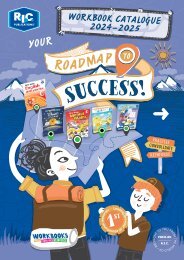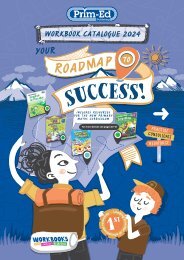RIC-5126 NZ Teaching Comp Strategies Book F
Create successful ePaper yourself
Turn your PDF publications into a flip-book with our unique Google optimized e-Paper software.
Teachers notes<br />
What is comprehension?<br />
<strong>Comp</strong>rehension is a cognitive process. It involves the capacity of the mind to understand, using logic and reasoning. It is not, as some<br />
students sadly believe, trying to guess the answers to formal exercises, done with a pencil and paper, after reading text. Students need<br />
to know how to think about and make decisions about a text after reading it.<br />
<strong>Teaching</strong> comprehension<br />
<strong>Comp</strong>rehension skills can and should be developed by<br />
teaching students strategies that are appropriate to a particular<br />
comprehension skill and then providing opportunities for them<br />
to discuss and practise applying those strategies to the texts<br />
they read. These strategies can be a series of clearly defined<br />
steps to follow.<br />
Students need to understand that it is the process not the<br />
product that is more important. In other words, they need<br />
to understand how it is done before they are required to<br />
demonstrate that they can do it.<br />
With higher order comprehension skills, care needs to be<br />
taken to ensure that the text is at an appropriate level and that<br />
the language of discussion is also age-appropriate.<br />
The emphasis should be on discussion of: the text, thinking<br />
processes, activities and strategies that can be used to better<br />
comprehend text.<br />
Many students will benefit from completing some of the<br />
comprehension activities orally before moving to supported<br />
and then independent pen and paper work.<br />
Note: The terms skills and strategies are sometimes<br />
confused. The following explanation provides some clarification<br />
of how the two terms are used in this book.<br />
Skills relate to competent performance and come from<br />
knowledge, practice and aptitude.<br />
<strong>Strategies</strong> involve planning and tactics.<br />
In other words, we can teach strategies that will help students<br />
to acquire specific comprehension skills.<br />
Metacognitive strategies<br />
Metacognitive strategies, teaching students how to think about<br />
thinking, are utilised in developing the twelve comprehension<br />
skills taught in this book. Metacognitive strategies are modelled<br />
and explained to students for each skill. As this is essentially<br />
an oral process, teachers are encouraged to elaborate on and<br />
discuss the explanations provided on the ‘Learning about the<br />
skill’ pages and to talk about different thought processes they<br />
would use in answering each question.<br />
Students will require different levels of support before they are<br />
able to work independently to comprehend, make decisions<br />
about text and choose the best answer in multiple choice<br />
questions. This support includes modelling the metacognitive<br />
processes, as well as supported practice with some hints and<br />
clues provided.<br />
<strong>Comp</strong>rehension strategies<br />
The exercises in this book have been written not to test, but to<br />
stimulate and challenge students and to help them to develop<br />
their thinking processes through modelled metacognitive<br />
strategies, discussion and guided and independent practice.<br />
There are no trick questions, but there are many that require<br />
and encourage students to use logic and reasoning.<br />
Particularly in the higher order comprehension skills, there<br />
may be more than one acceptable answer. The reader’s prior<br />
knowledge and experience will influence some of his or her<br />
decisions about the text. Teachers may choose to accept an<br />
answer if a student can justify and explain his or her choice.<br />
Therefore, some of the answers provided should not be<br />
considered prescriptive but more a guide and a basis for<br />
discussion.<br />
There are students with excellent cognitive processing skills<br />
and a particular aptitude for and interest in reading who<br />
develop advanced reading comprehension skills independently.<br />
However, for the majority of students, the strategies they need<br />
to develop and demonstrate comprehension need to be made<br />
explicit and carefully taught, not just tested; the rationale behind<br />
this series of books.<br />
<strong>Teaching</strong> comprehension strategies iv www.ricpublications.co.nz ~ R.I.C. Publications ®<br />
ISBN 978-1-925431-24-7

















